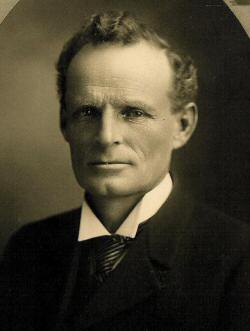Arthur Hamlin Sholts was born February 6, 1861, in the town of Rutland, the son of Martin and Almeda Sholts. He received his early education in the Devine school and was a member of the first graduating class of the Oregon High School in 1884. He completed his academic education in Whitewater Normal, graduating in 1889.Mr. Sholts was a born teacher, possessing  the rare ability of inspiring his students to love learning for its own sake. His teaching career included Oak Hill and he served as principal of Oregon High, 1889 to 1893; Stoughton High, 1893 to 1902; and Evansville High, 1903 to 1907. the rare ability of inspiring his students to love learning for its own sake. His teaching career included Oak Hill and he served as principal of Oregon High, 1889 to 1893; Stoughton High, 1893 to 1902; and Evansville High, 1903 to 1907.
In 1908 Mr. Sholts retired from teaching to settle on the Frank Anderson Farm, purchased in 1902, with his wife, the former Alma Ames, whom he married Dec. 1, 1891. In 1919 he purchased the farm upon which he lived the remainder of his days and where his wife and son were still living in 1941. Bringing to farming a disciplined and trained mind, he soon became knows in the state as a leader in agriculture and was recognized by the University of Wisconsin College of Agriculture for distinguished service to agriculture. This honor was only one of many that came to Mr. Sholts. He was chairman of the town of Oregon, elected to the Assembly from the third district of Dane county, 1911-1913. Chairman of the Dane County Republican Committee, and had served six years on the Board of Regents of the University, to which he was appointed by Governor Kohler in 1929. One of the high points in Mr. Sholts’ life was a trip to Europe in the summer of 1930. He visited the land of his beloved Bobby Burns; walked the roads of the Lake District where Wadsworth had walked, toured Europe; witnessed the Passion Play at Oberamergau, and returned via Italy to America. It was a rich experience to Mr. Sholts, and for two years after he gave lectures to groups all over Wisconsin telling in his inimitable manner the story of his trip. Endowed with unusual mental capacity, Mr. Sholts could have directed his ambitions towards larger places but he chose to live in humble circumstances and to give his leadership and friendship to ordinary people. Honest, upright, and dependable, he was a composite of the virtues and strength, which characterized the people whose courage and integrity established America. Well Known Men of the Community. IN Souvenir of Oregon Centennial, Supplement to the OREGON OBSERVER, June 26, 1941, p. 33-35. |
